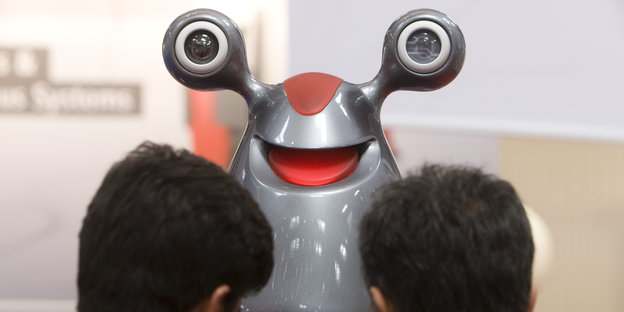sociology professor of technology
Klaus Dörre talks about the consequences of technological progress. What does it mean to work and workers in the coming decades?

A robot named Gilberto, now probably already outdated (Hannover 2009). Photo: AP
taz: Mr. Dörre, please explain with an example of what “fourth industrial revolution” means
Klaus Dörre: It is conceivable that: For a combine during harvest wears an engine part. Per mobile and Internet reports the vehicle the impending failure independently of the manufacturer. Largely without human intervention begins where the computerized production of the spare part. Within a few hours it can arrive via drone the farmer. In the rationalization thrust which is just starting to networked machines communicate with each other and to replace manual labor in part.
“Internet of Things” is the keyword. With sensors fitted clothes could then my health information be sent to the doctor’s office and make a personal examination unnecessary. How many of today’s jobs are at stake
The US sociologist Randall Collins holds 80 percent of US jobs at risk – and the occupations of the middle class by a qualified Education. The Oxford scientists Carl Benedikt Frey and Michael Osborne see risks for half the jobs in industrialized countries. Presumably, however, are both horror scenarios. Sabine Pfeiffer of the University of Hohenheim is more cautious: You said that twelve percent of today’s jobs are at risk rationalization. She stressed that factories would never be deserted. There would constantly something to fix and monitor.
What do you think?
We are experiencing just a quantum leap because, for example, grow the power of the Internet and the exchanged amounts of data rapidly. How does that impact on employment, we can not yet know. The past tells us about anything specific.
“34″ “Most citizens refuse believed that they are supplied in a nursing home robots”
We are in the dark?
I want to put it positively. The future is still influenced. We have options. Most citizens refuse believed that they are supplied in a nursing home robots. Not everything that appears technically possible is also made.
The first industrial revolution took place in the 18th and 19th centuries. The second applies electrification. What was it like at the third stage, when the computer was introduced 50 years ago – is there unemployment increased in industrialized countries
58, teaches and conducts research at the Friedrich Schiller University in Jena. He specializes in labor, industrial and economic sociology.
On a global scale, there was probably no clear job losses. However, in some countries it always came back to growth crisis and rising unemployment, which were contributed to by the rationalization. In Germany, for example, we have seen since 1991, a decrease of the working volume. The total number of hours worked and hours paid falls.
Is not it a good thing when improved technology and increased productivity enable us to work less and still earn enough?
Basically, yes. But we are dealing with a polarization. Well-qualified and paid people often work longer hours than the average of workers, less educated workers make than they would like during a few hours.
How could the material gain of progress evenly distributed?
A model would be that the productive export sectors of the German economy pay a higher portion of their profits than they are today, so you have to pay, for example, workers in nursing homes better can without partially replace them with care robots that bring the medication twice a day in bed. These financial transfers could be organized with the help of tax policy.
No comments:
Post a Comment